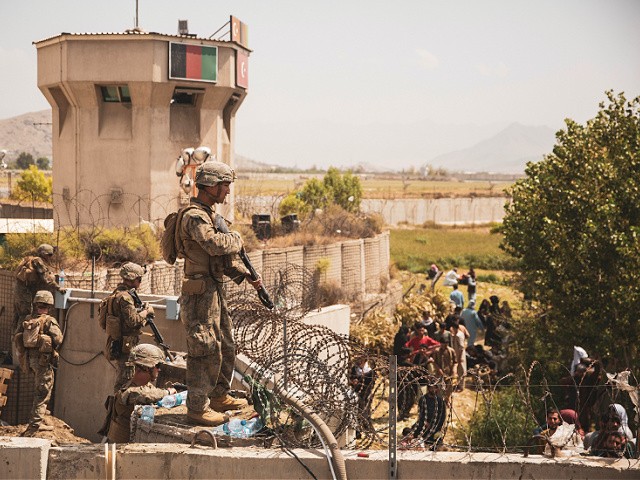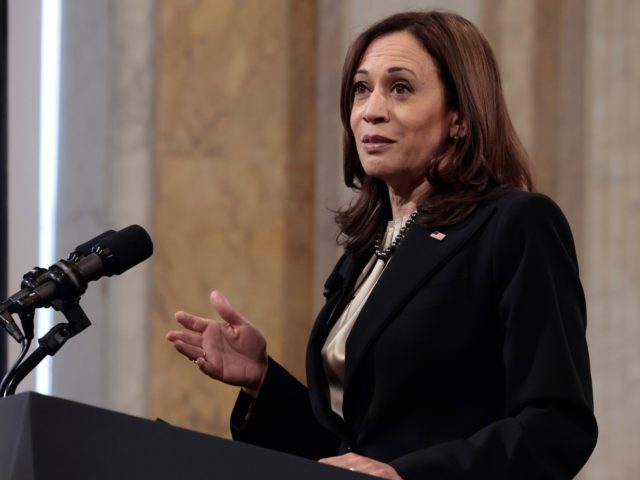Vice President Kamala Harris repeatedly lied about the botched Afghanistan withdrawal during her interview Sunday on Face the Nation with CBS regarding the peace plan outlined by former President Donald Trump.
Saying she “fully supported” President Joe Biden’s botched pullout from Afghanistan, the vice president falsely said Trump negotiated a peace deal without the Afghan government and Biden simply honored the agreement his predecessor set forward.
I fully supported the president’s decision to after what was taking on the fact of being an endless war, of pulling American troops out, and I think it’s really important to remember that the previous administration negotiated a deal with the Taliban, did not invite the Afghan government to be at the table, and negotiated a deal that- that required and promised as part of an agreement that we would pull out by the end of May.
So, we were saddled with that responsibility based on an agreement between the United States and the Taliban.
Harris also said if the Biden administration allegedly did not follow through on the deal set forward by Trump it would have prolonged the conflict.
“We made the decision that if we were to break the agreement, it would have been a whole other situation, and right now I strongly believe that had we broken that agreement, we would be talking about the war in Afghanistan,” she added. “And American troops in Afghanistan, and we’re not talking about that. I don’t regret that.”
Biden did not mention the fact that extensive talks featuring both the legitimate Afghan government & the Taliban took place under President Trump in 2020, resulting in an agreement to withdraw all U.S. military servicemen from Afghanistan by May 1, 2021. https://t.co/aJi5ZxBus9
— Breitbart News (@BreitbartNews) April 29, 2021
Regarding the vice president’s first assertion that Trump did not include the Afghan government in peace negotiations, as Breitbart News politics editor Matthew Boyle reported in September 2020, both “Afghan government officials and Taliban leaders” were present for the talks that set serious conditions on whether or not the United States would fully withdraw from the country by the spring of 2020:
Pompeo met with both parties as well as with Qatari leaders. These negotiations follow the Feb. 29 agreement between the United States and Taliban leaders that laid out the framework for U.S. withdrawal from Afghanistan, including most importantly a Taliban commitment not to harbor terrorists from groups like al-Qaeda, which they were doing when they were in power before and in the immediate aftermath of the 9/11 terrorist attacks on the United States in 2001.
The Washington Post also reported in September 2020 that “the Afghan government came face-to-face with Taliban leaders” at the peace talks in Doha, Qatar.
“The launch of direct, formal talks between the two sides began with an opening ceremony featuring Secretary of State Mike Pompeo,” the Post began.

U.S. Marine Corps Marines assist with security at an evacuation control checkpoint at Hamid Karzai International Airport in Kabul, Afghanistan, Friday, Aug. 20, 2021. (Staff Sgt. Victor Mancilla/U.S. Marine Corps via AP)
While the Trump administration did aim to have all American troops pulled out by the spring of 2021, Kamala Harris failed to mention the weighty conditions put in place in order to meet that deadline. As former Secretary of State Mike Pompeo told Matthew Boyle aboard the U.S. Air Force jet returning from Qatar, the conditionality was “three-fold,” requiring the Taliban to cease harboring terrorists, hold substantive talks with the Afghan government, and resist outside agitators.
The conditionality is really three-fold. One, there is an obligation they have with respect to foreign terrorist groups — primarily al-Qaeda, but all four terrorist groups — they are not permitted, and the language is very clear that they are not permitted and that they have to break with them.
Second, they have to engage in these conversations in a way that is substantive and not just physically sit in the room, but they need to have serious conversations and begin to work their way through it.
Then, third, they have a responsibility as part of that to ensure that outside actors don’t act as spoilers for this, and there are many hands who would like to see this undone and would like to see America mired in Afghanistan for another 20 years. Both the Afghan government and the Taliban have a responsibility to prevent that.
Pompeo explicitly said that those conditions would be measured and monitored before the agreement could be met by the United States.
“Those are the conditions, we’ll measure them,” he said. “There’s a set of CT metrics that’s pretty clearly laid out. We’ll measure them and the president will make a decision if there’s sufficient compliance to get us to zero. I think we’re on a pathway to achieve that.”
Joe Biden said “the buck stops with me” and then proceeded to blame others for the catastrophic Taliban takeover of Afghanistan. https://t.co/0dNV21N039
— Breitbart News (@BreitbartNews) August 17, 2021
President Biden also withdrew from Afghanistan at a later date than the one set forward in the agreement – when weather conditions would have severely hampered the Taliban takeover. As the left-of-center Vox lamented at the time:
Biden’s predecessor Donald Trump made a deal with the Taliban requiring all American service members to leave Afghanistan at the start of May. If they don’t withdraw by then, the insurgents will end a months-long moratorium on targeting US troops, potentially adding to the 2,400 Americans already killed in the war since 2001.
The choice facing Biden was always a tough one: Abide by the Trump-era agreement and leave by May 1 — risking the Taliban’s hostile takeover of the country as soon as the US departs and the reversal of progress on women’s and children’s rights that would inevitably follow; or violate the agreement and stay in order to pressure the Taliban to strike a peace deal with the Afghan government, risking more dead American service members in the meantime.
Lastly, Biden not only withdrew from Afghanistan without honoring the conditions set by his predecessor, he also left billions of dollars in American military equipment behind for the Taliban to control and did not even secure the capital city of Kabul before hastily pulling out American troops, leaving thousands of U.S. residents and allies behind.

COMMENTS
Please let us know if you're having issues with commenting.